Im trying to collect the foreign key mapping from system tables. And I used this below query.
query 1:
select
kcu.table_schema,
kcu.table_name as foreign_table,
string_agg(kcu.column_name, ', ') as fk_columns,
rel_tco.table_name as primary_table,
kcu.constraint_name
from
information_schema.table_constraints tco
join information_schema.key_column_usage kcu on
tco.constraint_schema = kcu.constraint_schema
and tco.constraint_name = kcu.constraint_name
join information_schema.referential_constraints rco on
tco.constraint_schema = rco.constraint_schema
and tco.constraint_name = rco.constraint_name
join information_schema.table_constraints rel_tco on
rco.unique_constraint_schema = rel_tco.constraint_schema
and rco.unique_constraint_name = rel_tco.constraint_name
where
tco.constraint_type = 'FOREIGN KEY'
group by
kcu.table_schema,
kcu.table_name,
rel_tco.table_name,
rel_tco.table_schema,
kcu.constraint_name
order by
kcu.table_schema,
kcu.table_name;
But this won't provide the Primary tables columns that are pointing as Fk. So I found this query on Stackoverflow.
query 2
SELECT
tc.table_schema,
tc.constraint_name,
tc.table_name,
kcu.column_name,
ccu.table_schema AS foreign_table_schema,
ccu.table_name AS foreign_table_name,
ccu.column_name AS foreign_column_name
FROM
information_schema.table_constraints AS tc
JOIN information_schema.key_column_usage AS kcu
ON tc.constraint_name = kcu.constraint_name
AND tc.table_schema = kcu.table_schema
JOIN information_schema.constraint_column_usage AS ccu
ON ccu.constraint_name = tc.constraint_name
AND ccu.table_schema = tc.table_schema
WHERE tc.constraint_type = 'FOREIGN KEY'
Now this query gives individual columns. Lets say there is a FK like (logid, item) then I'll get two rows. I thought to use string_agg with my first query, I got the results but it endup duplicates. Like(logid, item,logid, item)
query with duplicates:
select
kcu.table_schema,
kcu.table_name as foreign_table,
string_agg(kcu.column_name, ', ') as fk_columns,
rel_tco.table_name as primary_table,
kcu.constraint_name,
string_agg(ccu.column_name, ', ') as pk_columns
from
information_schema.table_constraints tco
join information_schema.key_column_usage kcu on
tco.constraint_schema = kcu.constraint_schema
and tco.constraint_name = kcu.constraint_name
join information_schema.referential_constraints rco on
tco.constraint_schema = rco.constraint_schema
and tco.constraint_name = rco.constraint_name
join information_schema.table_constraints rel_tco on
rco.unique_constraint_schema = rel_tco.constraint_schema
and rco.unique_constraint_name = rel_tco.constraint_name
JOIN information_schema.constraint_column_usage AS ccu
ON ccu.constraint_name = tco.constraint_name
where
tco.constraint_type = 'FOREIGN KEY'
group by
kcu.table_schema,
kcu.table_name,
rel_tco.table_name,
rel_tco.table_schema,
kcu.constraint_name
order by
kcu.table_schema,
kcu.table_name;
Can someone help me to fix this query?
Example FK:
ALTER TABLE myschema.user ADD CONSTRAINT view_option_fk01 FOREIGN KEY (account_id, user_id) REFERENCES myschema.account(account_id, user_id);
